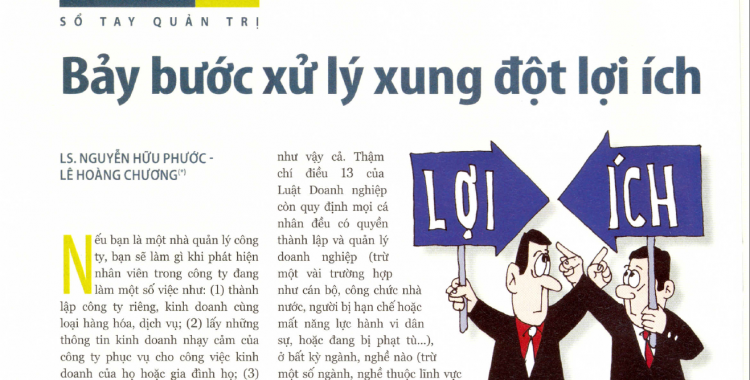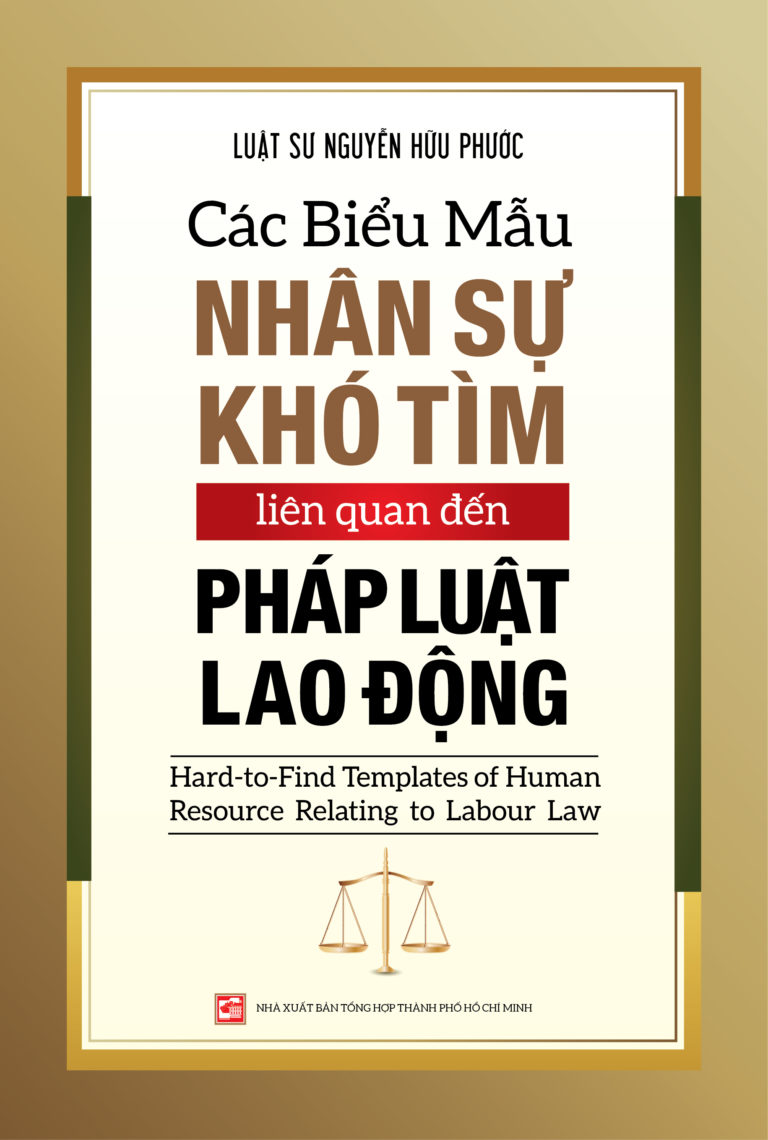7 steps in conflict of interest settlement in Vietnam
The article titled: “7 steps in conflict of interest settlement” from Lawyer Nguyen Huu Phuoc is published on Sai Gon economic times, dated 08 Mar 2012.
***
If you are a manager of a company, what would you do when you detect your staff in doing some things such as:
(1) establishing their own companies trading commodities or providing services that your company are offering;
(2) taking some sensitive business information of your company for their business or their families;
(3) through their companies or their families providing some services and goods for suppliers, customers of your company;
(4) taking advantage of their position and power in your company to make transactions with third parties for their personal purposes;
(5) representing your company to buy goods or services from suppliers which are companies established by them or their relatives;
(6) receiving valuable gifts from suppliers or customers of your company;
(7) doing extra work for your company’s competitors.
This is referred to as “interest conflict” (IC), occurring when personal interests of the employee or of a “related party” with the employee can influence the decision of the employee or impair the ability of the employee to act for the best interest of the employer. “Related party” may be the employee’s family, friends, or an enterprise that the employee pays a significant attention, or anyone that the employee owes a duty.
Before making the decision of disciplinary measure or dismissal of the employee committing the above mentioned violations, we should see whether each of the above acts is prohibited by current law of Vietnam.
For the act as the employee establishes his own company trading goods or providing services that your company is offering, there are not any regulations prohibiting employees to do so. Even Article 13 of the Law on Enterprises also stipulates that all individuals have the right to establish and manage enterprises (except a few cases of State officials and employees, or those who have limited or lose of civil act capacity, or sentenced to imprisonment, etc.) in any industry or field (except for some lines of business prohibited by government regulations).
Therefore, this provision cannot be included in the regulations of your company and according to the law your company shall not officially prohibit the employees to do this. What your company may do is to prohibit the employees to use work time for your company, labour tools, business information of your company to serve their own business and they should be encouraged to inform your company about these IC so that your company has a way to manage risks accordingly.
Regarding the employee takes a number of sensitive business information of your company to serve the business of his own or of his family, this issue has been provided in Article 85.1 (a) of the Law on Labour. Accordingly, if the employee reveals the business or technology secret of the company that the company can clearly demonstrate, he may be subject to disciplinary dismissal. However, in reality, it is not easy to get the evidence the act.
Regarding the matter that the employee, through his or his family’s company, provides certain services and goods to the suppliers or customers of your company or even borrows money from them, the current law does not prohibit these acts.
The right of the individual to freely do business has been provided in the current Law on Enterprises, and the right of merchants to freely do commercial transaction has been provided in the current Commercial Law, namely the parties may freely agree as long as not contrary to the provisions of the law, fine traditions and social morals to establish the rights and obligations of the parties in the commercial activities.
Regarding the matter that the employee abuses his position and power in your company to transact with third parties to serve his personal purposes, Article 85.1 (a) of the Law on Labour provides that an employee committing the acts that cause serious damage to properties and interests of an enterprise may be subject to the disciplinary dismissal, but on the condition that the level of causing damage must be defined at a specific amount and recorded in the labour regulations that have been registered at the State management agency on labour.
Regarding the matter that the employee purchases commodities or services for your company from the suppliers that are the companies founded by his relatives, the current law does not prohibit the act. This procurement is an agreement between the parties (between your company and the concerned company of the employee), so in case of violation, the dispute will be resolved based on the contents agreed by the parties and regulations of the law.
Regarding the matter that the employee accepts gifts from suppliers or customers of your company, this would make the employee of your company lack of sense of justice or be biased in the transaction and the deal with suppliers or customers of your company, affecting the benefits of your company.
However, current law only prescribes the gift acceptance of agencies, organizations, units of the State and the State officials, public servants in accordance with the Law on Anti-Corruption, and has not regulations for other objects. Moreover, the acceptance of gifts is not an act directly causing a conflict of interest with your company, which only impacts the employee to cause an indirect conflict of interest with your company, so not likely to be deemed as a direct violation in view of the current law of Vietnam.
Regarding the matter that the employee works as a second job for a competitor of your company, this to some extent cannot be banned because according to Article 30.3 of the Law on Labour and Article 5.1 of Decree No. 195/CP that is amended and supplemented by Decree No. 109/2002/ND-CP, the employee may sign one or more labour contracts with one or more employers at the same time if he is capable of performance of many contracts and can ensure the working time and rest time as prescribed by the law.
So your company may only disagree with the employee working as the second job if he does not guarantee the working time and rest time prescribed by the law.
IC may be related to labour discipline and sense of working of the employees, as well as damage the reputation of your company, and place your company in a situation likely to incur liability to third parties. You can minimize the risks and liability on the condition that you, as the employer, be sure that: (1) IC under the regulations of your company is well understood by your employees, and (2) in terms of procedures, IC needs to be stopped quickly.
The following steps in a certain extent will help your company to reduce the risks.
Step 1: Prepare a regulation on IC to apply to your company Regulation on IC should include:
(i) A clear explanation of the situation that may raise IC,
(ii) Provision on accepting gifts or other perquisites from customers, suppliers of your company,
(iii) Provision that the employees shall not use office space, working tools, information, and the stationery of your company for the purposes of private business of the employees,
(iv) Encouraging the employees to inform your company of the IC as soon as it arises or has the potentiality to arise as well as individual business transactions that the employees have before working for your company with signs of violation of the regulation on IC,
(v) Notifying about employees to be responsible for IC so that the employees can report issues related to IC,
(vi) Provision on procedures for internal investigation and management regarding IC, and
(vii) A clear statement that any violation of the regulation on the IC will lead to consideration of the application of disciplinary measures in accordance with the registered internal regulations, including the highest disciplinary labour sanction as dismissal in a few cases of serious violation where the law permits to dismiss.
Step 2: The drafted regulation on IC should be amended and supplemented by a law firm or lawyer with expertise in labour law in Vietnam to conform and comply with the provisions of the law of Vietnam.
Step 3: Put the content in IC regulation into internal labour regulations of the company, prescribing clearly the form of the relevant sanctions depending on the seriousness of the violation and the specific damage caused (reprimanding, prolonging the period of wage increase or transferring the employee to another job or dismissing him).
The internal regulations need to be registered with the State management agency (on labour) in province or city directly under the Central Government to apply legally.
Step 4: Post the content of the internal regulations that have been amended, supplemented and registered in the internal network (intranet) as well as hang them on the bulletin board in the offices of your company to let people know. To be more careful, they may be copied for each employee and the employees are required to confirm that they have read and understood the content of the internal regulations that is adjusted and supplemented.
Step 5: Every year, the legal department of the company will host at least one thematic talk on compliance with the provisions of IC to the employees with the purpose to enhance their awareness, updating them with changes to the provisions of IC of the Company as well as reviewing the violations have arisen in practice in your company for people to note.
Step 6: Ensure that the employees know who is mainly responsible for compliance with the provisions of IC in your company so that they can report or discuss in case of necessity
Step 7: For cases of first violation, it is necessary to apply strict labour discipline under the spirit of the content of registered internal labour regulations and the order of disciplinary procedures in accordance with regulations of the labour law so that people will take it as an example in order to be serious in the compliance to the regulation on IC.










